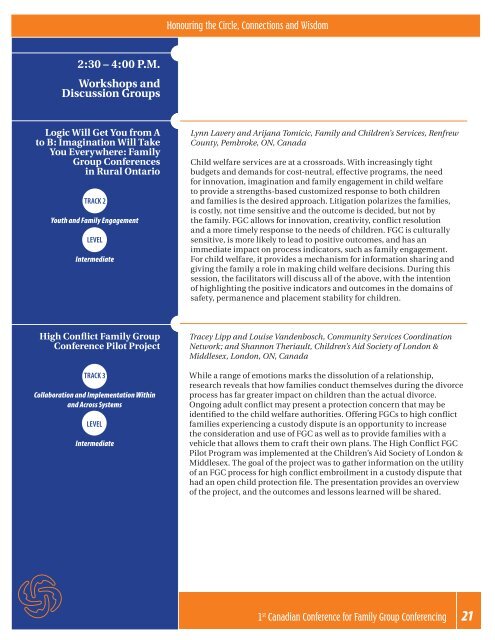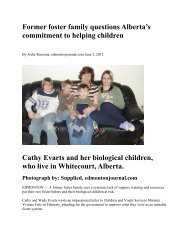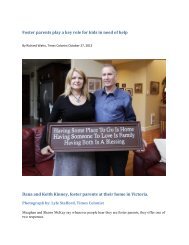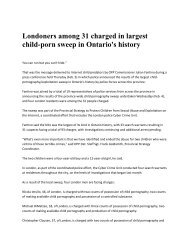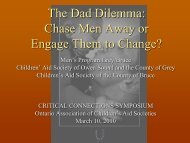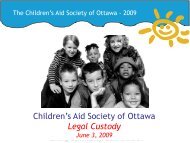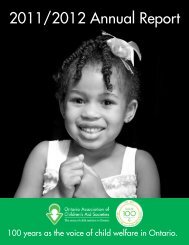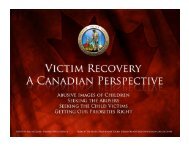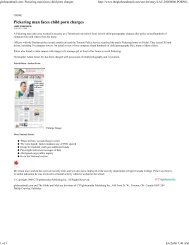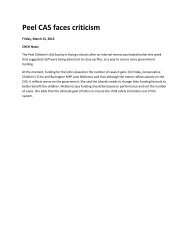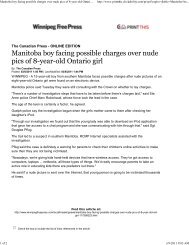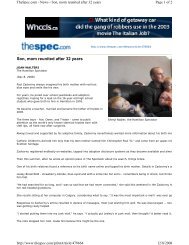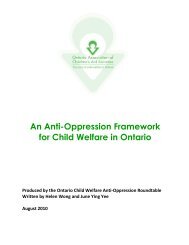PROGRAM GUIDE - American Humane Association
PROGRAM GUIDE - American Humane Association
PROGRAM GUIDE - American Humane Association
Create successful ePaper yourself
Turn your PDF publications into a flip-book with our unique Google optimized e-Paper software.
Honouring the Circle, Connections and Wisdom<br />
2:30 – 4:00 P.M.<br />
Workshops and<br />
Discussion Groups<br />
Logic Will Get You from A<br />
to B: Imagination Will Take<br />
You Everywhere: Family<br />
Group Conferences<br />
in Rural Ontario<br />
TRACK 2<br />
Youth and Family Engagement<br />
LEVEL<br />
Intermediate<br />
Lynn Lavery and Arijana Tomicic, Family and Children’s Services, Renfrew<br />
County, Pembroke, ON, Canada<br />
Child welfare services are at a crossroads. With increasingly tight<br />
budgets and demands for cost-neutral, effective programs, the need<br />
for innovation, imagination and family engagement in child welfare<br />
to provide a strengths-based customized response to both children<br />
and families is the desired approach. Litigation polarizes the families,<br />
is costly, not time sensitive and the outcome is decided, but not by<br />
the family. FGC allows for innovation, creativity, conflict resolution<br />
and a more timely response to the needs of children. FGC is culturally<br />
sensitive, is more likely to lead to positive outcomes, and has an<br />
immediate impact on process indicators, such as family engagement.<br />
For child welfare, it provides a mechanism for information sharing and<br />
giving the family a role in making child welfare decisions. During this<br />
session, the facilitators will discuss all of the above, with the intention<br />
of highlighting the positive indicators and outcomes in the domains of<br />
safety, permanence and placement stability for children.<br />
High Conflict Family Group<br />
Conference Pilot Project<br />
TRACK 3<br />
Collaboration and Implementation Within<br />
and Across Systems<br />
LEVEL<br />
Intermediate<br />
Tracey Lipp and Louise Vandenbosch, Community Services Coordination<br />
Network; and Shannon Theriault, Children’s Aid Society of London &<br />
Middlesex, London, ON, Canada<br />
While a range of emotions marks the dissolution of a relationship,<br />
research reveals that how families conduct themselves during the divorce<br />
process has far greater impact on children than the actual divorce.<br />
Ongoing adult conflict may present a protection concern that may be<br />
identified to the child welfare authorities. Offering FGCs to high conflict<br />
families experiencing a custody dispute is an opportunity to increase<br />
the consideration and use of FGC as well as to provide families with a<br />
vehicle that allows them to craft their own plans. The High Conflict FGC<br />
Pilot Program was implemented at the Children’s Aid Society of London &<br />
Middlesex. The goal of the project was to gather information on the utility<br />
of an FGC process for high conflict embroilment in a custody dispute that<br />
had an open child protection file. The presentation provides an overview<br />
of the project, and the outcomes and lessons learned will be shared.<br />
1 st Canadian Conference for Family Group Conferencing 21


